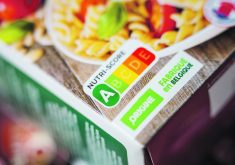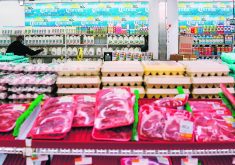In Canada, consumers and producers are used to terms like cage-free eggs, pasture-raised cattle, and other positive welfare attributes adorning products on grocery store shelves.
These labels have appeared on egg cartons and other products for decades, aimed at conscious consumers who want to ensure animals have the chance to move.
Globally, methods of production labels have expanded over the years to include the whole spectrum of welfare. And for good reason: labelling animal products with their production method, which includes telling consumers when animals have been kept in cages, has proven positive outcomes for animals, consumers and producers.
Read Also

Kochia has become a significant problem for Prairie farmers
As you travel through southern Saskatchewan and Alberta, particularly in areas challenged by dry growing conditions, the magnitude of the kochia problem is easy to see.
For more than a decade, the European Union has mandated that eggs bear labels reflecting how birds were treated — marked as either cage, barn, free-range or organic.
In the United Kingdom, total cage-free production has increased 20 percent since these labels took effect. And a year after some Australian areas introduced mandatory cage egg labels, several retailers reported cage-free egg sale increases of up to 90 percent. When a major Canadian grocer started voluntarily labelling all eggs by method of production — including cage eggs — there was predictably a boost in cage-free sales, but egg sales as a whole did not decrease.
This indicates that labels give consumers the power to vote with their wallets and they are voting for positive change for animals.
All the evidence suggests that producers should be championing method of production labelling. These labels help producers better understand what consumers want.
Polling shows that most Canadians say they would spend more to purchase animal products that come from more humane systems, but current labels are confusing and lack consistent and adequate information. Thus, consumers are groping in the dark for products that promote better animal treatment, and producers, who stand to gain the market support they need to move to higher welfare systems, are missing opportunities as a result.
Marketing research data tells us that labelling eggs from caged chickens predictably boosts sales of their cage-free counterparts but don’t hurt egg sales as a whole. So in supply managed systems like eggs, poultry, and dairy, producers have little to lose and everything to gain.
In traded commodities like beef and pork, Canadian industries have the chance to shine on a global stage increasingly concerned with transparency and animal welfare.
The public doesn’t support farming practices that keep animals confined in cages and the best available science confirms that animals in cage-free systems have better welfare than those forced to live in tight confinement. Animals that can move and express natural behaviours require different husbandry practices, and many forward-thinking producers are embracing that change. After all, what industry has ever thrived when it refused to innovate or to respond to its customers’ demands?
Producers are telling consumers the stories of where their food comes from, but this approach can’t work unless that story is in line with customers’ values. Canadians are concerned about how farm animals are treated, and this concern is increasing.
The Canadian Food Inspection Agency is midway through overhauling Canadian labelling requirements, and labelling animal products with method of production is on the table.
Producers and processors should support the adoption of these labels as a way to help their industries innovate, provide animals a higher level of welfare, and to help their own long-term bottom lines. It’s one area where everyone wins.
Sayara Thurston is campaign manager at Humane Society International/Canada

















